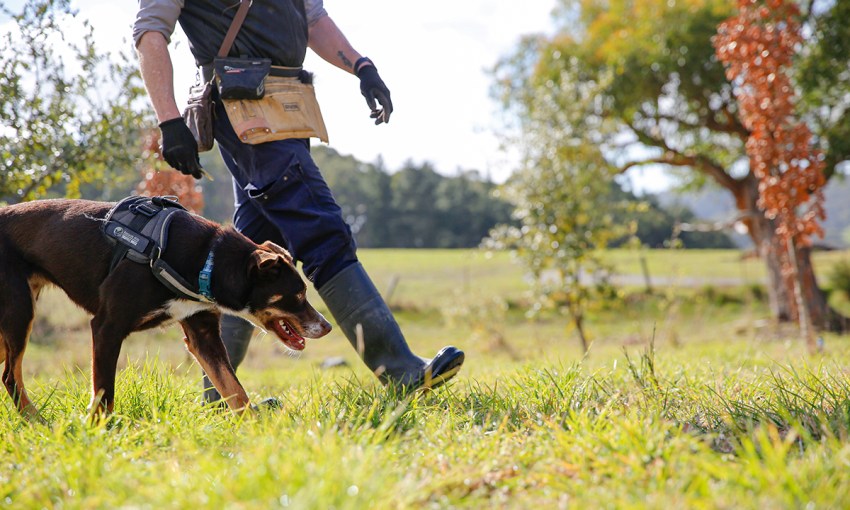The prized gem of a budding Adelaide Hills truffle industry is a pup named Ruby who’s worth her weight in gold.
The truffle hunters
Tails are wagging in anticipation as a car boot is unlatched, allowing Koolie Ruby and Labrador Gus to spring into the crisp winter air at Piccadilly, where the sun has just dispersed the morning fog.
The dogs are sniffing about and prowling the undergrowth near rows of small English oaks, hazelnuts and holly oaks planted in neat formation across a two-hectare paddock. Hot on their tails are handlers Warren Rogers and Dean Poletta.
Today, the Adelaide Hills Truffle Dogs are working a hunt at Quercus Truffles — the truffiere of surgeon Matt Lawrence, who planted 470 oak and hazelnut seedlings seven years ago. The farm has produced promising yields this season, despite still being a few years away from maturity.
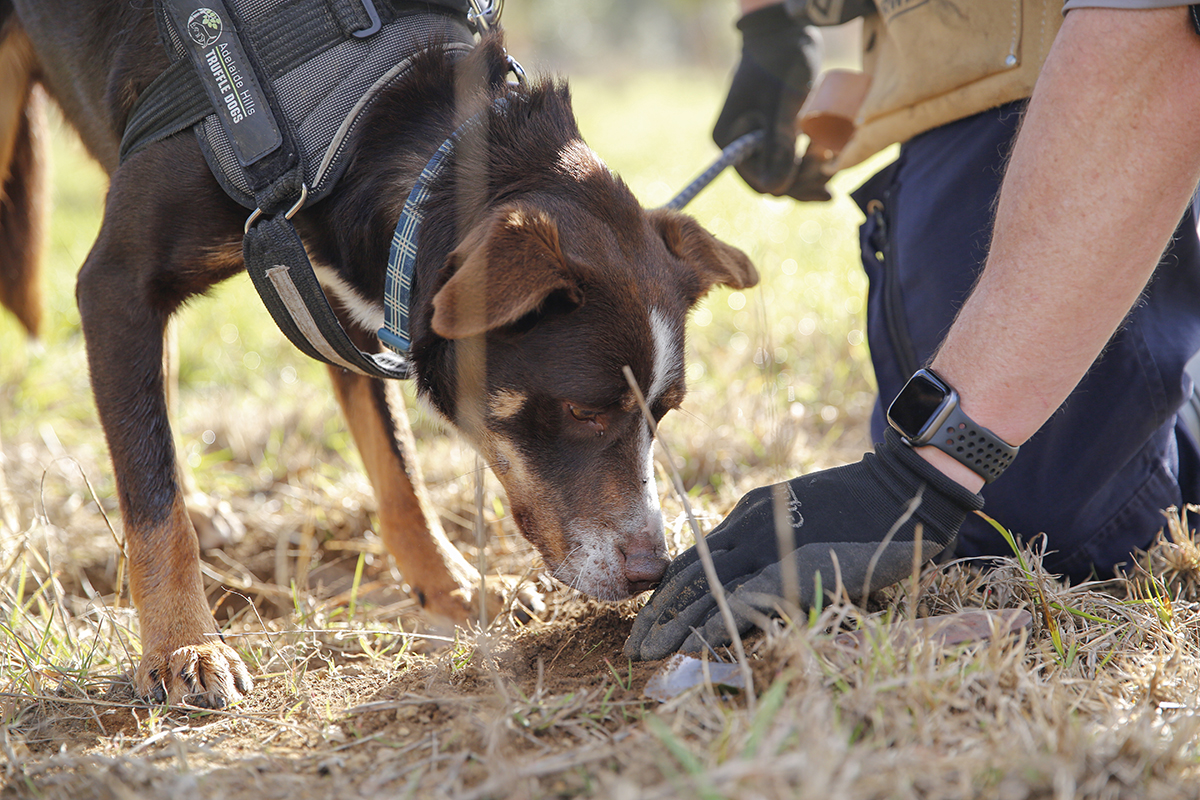
Truffles wholesale for about $1500 per kilogram and good-yielding farms interstate can produce 100 kilograms per hectare over a season, which starts from about mid-May.
“This is one of the biggest truffieres in Adelaide,” Warren says. “There are only about three farms that are producing regularly that we know of: it’s such a fickle thing.”
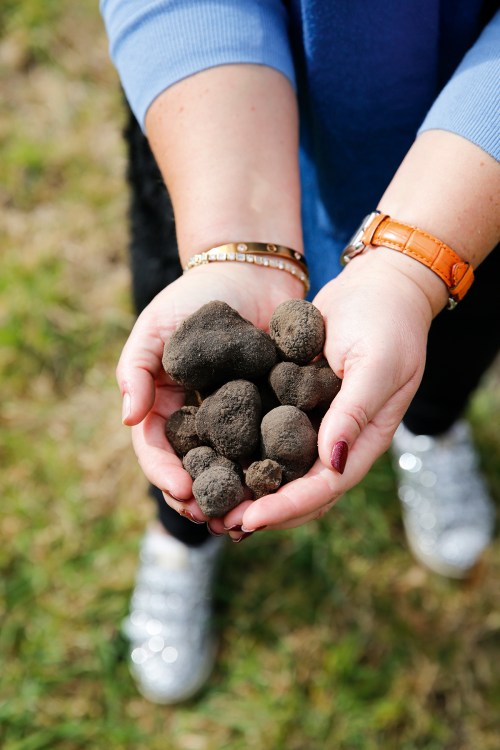
Today is actually a day off from Warren and Dean’s regular jobs as police dog handlers. The officers have more than 20 years’ combined experience training Labradors to sniff out contraband substances. In their spare time, the colleagues have been training their canines Ruby and Gus for a very different assignment.
At 22-months-old, Ruby is the star of the show. Warren took her on as a puppy, with the intention of training her to find truffles, but also to be his companion.
There was no guarantee that Ruby would sniff out a single truffle, but the boys were delighted when she found her first this winter and over ensuing weeks helped uncover kilograms of the rare fungi for their clients.
On one occasion, the team delivered a three-kilogram haul for the ecstatic owners of a Myponga truffiere, believed to be the largest one-day yield ever in South Australia.
“We were a bit concerned whether it was going to work with Ruby, but she’s exceeded our expectations and she’ll lead our business for the next eight to 10 years,” Warren says.
“Ruby is one of the smartest dogs and quickest learners that I’ve ever had the pleasure to deal with. Her appetite to learn, and more importantly to genuinely want to please me, are her best attributes.
“This is her place on the farm. She’s still learning the truffle-hunting craft and her best years are ahead of her. They don’t start maturing until about three or four, so she’s ahead of schedule.”
Dean says pigs are traditionally used to find truffles, but they will eat the prize. “Also, get your hand in the way of a pig and they’ll take your fingers off,” Dean says.
Traditionally sheep herding dogs, Koolies make perfect truffle hunters. With more stamina than Labradors like Gus, Ruby is able to traverse the hilly terrain without difficulty. She even has her own social media tag – #rubythetrufflehunter.
The weather is starting to warm up, indicating that the season is drawing to an end. Still, Ruby has picked up a scent and drops down to dig near the base of a tree.
“Good girl! Show me!” calls Warren as he crouches down with his tools, prying up dirt and bringing the soil to his nose, searching for the sweet, earthy scent of truffle.
“Finding a good truffle is a great feeling. The dogs start getting a bit frustrated when we don’t find one for a while because they don’t get rewarded as often,” Warren says.
Establishing a truffiere such as this one costs up to hundreds of thousands of dollars and growers have been known to fly truffle hunters in from interstate to do the hunting – a great expense to potentially find nothing.
Having a dog training background, Warren and Dean saw a niche opening in the South Australian industry.
Nearby, Gus has found a truffle for Dean, who points out that truffles are difficult to see in the soil, as he brushes away the dirt from a half-uncovered treasure. While it’s Gus’ job to locate the general area of the truffle, Dean has to find it using his own nose.
“There’s a difference in the smell of the soil around a truffle — there’s a bit of a sweetness to it. The hardest thing is not damaging the truffle,” Dean says as he masterfully prises a specimen out of the ground.
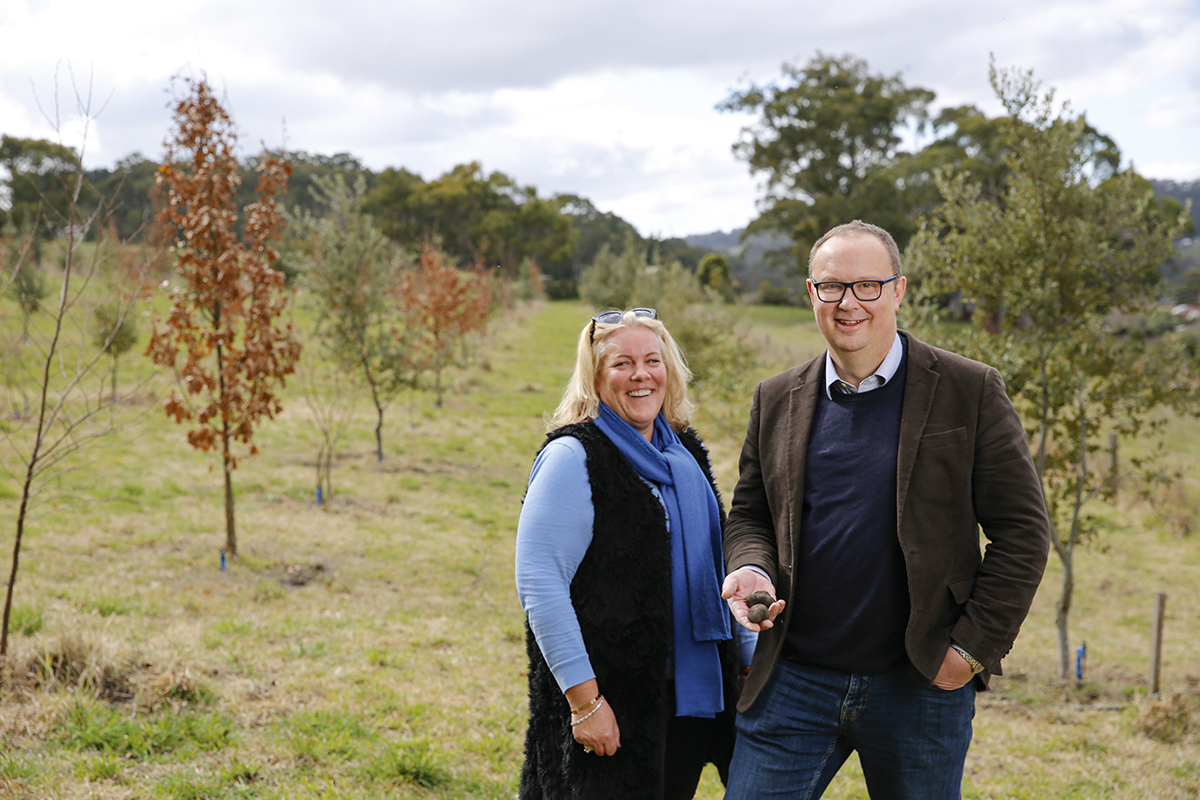
“That’s a really good one: it’s the odour, the firmness, and it’s got a bit of weight behind it. Restaurants like them to have a soft roundness, not so much the knobbly ones. If your soil is nice and fluffy and it’s a bit loamy, the truffle grows this nice round shape.”
In just 12 hours’ time, truffles from today’s hunt will be in the hands of Hardy’s Verandah Restaurant executive chef Jin Choi just a few kilometres away, while 2KW bar and Restaurant also serves truffles from this location.
The truffle fungus, part of the mushroom family, grows from the roots of host trees. Many people have attempted to cultivate the rare delicacy in the Adelaide Hills with unreliable results. That is beginning to change with committed landowners such as Matt.
“I approach it very much like a scientist, which has been my training,” Matt says. “We’ve put a lot of time and money into establishing the infrastructure. This season has been really exciting and we’ve regularly had over a kilogram of good quality truffles in a week.”
This section of Matt’s property is on the wrong side of the hill to grow grapes, but it has a similar climate to Piemonte in Northern Italy — the home of the famous white truffle.
“Nobody’s ever successfully cultivated a white truffle in captivity, so to speak. We’ve got some poplar trees infected with them just to see how it goes,” Matt says.
To establish the farm, tonnes of earth were excavated and backfilled with limestone and additives to create an alkaline soil. Rootlings were first inoculated with French black truffle spores and nurtured for two years before being planted.
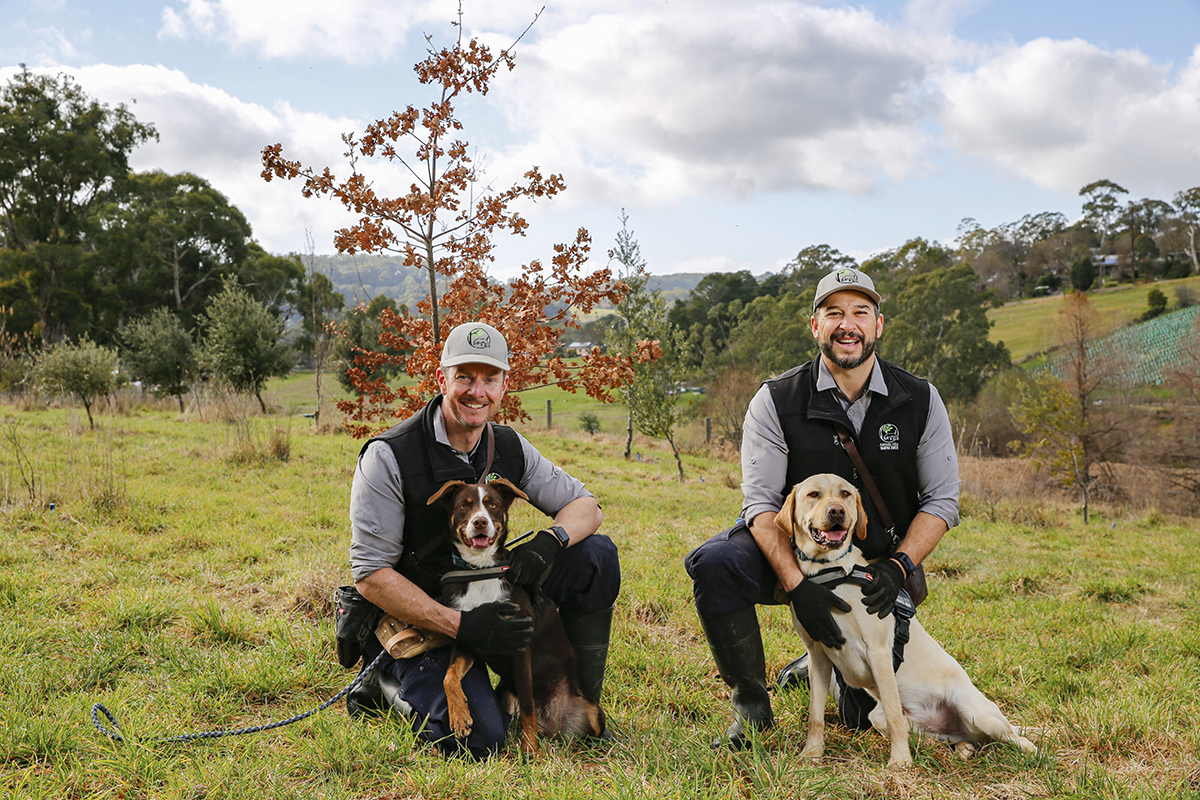
“Truffles are such an amazing product because when you open the box there’s just an overwhelming scent; the chefs pick them up and just sigh. It’s the perfect product and it sells itself in a way,” Matt says.
With their first productive truffle season coming to an end, Warren and Dean have hung up the hunting tools for this year and are excited with what 2021 may bring.
For now, Ruby gets a well-earned rest.
“When we first picked up Ruby from Kuitpo Koolies, they told us that Koolies have an off switch, which at first I didn’t believe. But now seeing her on days off, she’s just as happy to be lazing about,” Warren says.
“In the industry, we have a saying to ‘trust your dog’. The dogs are very rarely wrong, and it’s more likely the handlers that have made a mistake. But let’s not let the dogs know that.”
This story first appeared in the September 2020 issue of SALIFE magazine.



